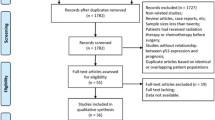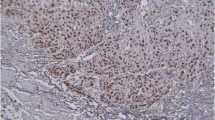Abstract
The p53 protein is involved in many biological functions in cancer, such as cell cycle arrest, DNA repair, apoptosis, senescence, DNA metabolism, angiogenesis, and cellular differentiation. However, the association between p53 expression and clinicopathological findings or prognosis in esophageal squamous cell carcinoma (ESCC) is controversial. We designed a large-scale study of 830 operable ESCC patients with a long follow-up to investigate the relationship between p53 expression and the clinicopathological characteristics and prognosis of patients. Immunohistochemistry was used to detect p53 protein expression. When the patients were divided into two groups, a positive expression group and a negative expression group, p53-positive expression positively correlated with a poorer differentiation level (P = 0.044). The overexpression of p53 was associated with a more advanced clinical stage (P = 0.015). A total of 775 patients were available for survival analysis. The median OS of 160 patients who had p53-positive expression and 486 patients who had p53-negative expression were 58.8 and 46.3 months, respectively (P = 0.021); the median PFS of the two groups were 39.6 and 27.5 months, respectively (P = 0.015). Lymph node metastasis, gender, differentiation, depth of invasion, and p53 protein expression were proven to have an influence on both OS and PFS in a univariate analysis. In the multivariate analysis, p53-positive expression maintained its independent prognostic impact on OS (P = 0.048) and PFS (P = 0.039), as did lymph node metastasis, differentiation, and depth of invasion. We identified that p53 protein-positive expression can serve as an independent, unfavorable prognosis biomarker in ESCC.


Similar content being viewed by others
References
Ferlay J SH, Bray F, Forman D, Mathers C & Parkin DM. GLOBOCAN 2008 v2.0, Cancer incidence and mortality worldwide: IARC cancerbase No. 10 [Internet]. Lyon, France: International Agency for Research on Cancer; 2010.
Siegel R, Naishadham D, Jemal A. Cancer statistics, 2013. CA Cancer J Clin. 2013;63(1):11–30. doi:10.3322/caac.21166.
Headrick JR, Nichols III FC, Miller DL, Allen MS, Trastek VF, Deschamps C, et al. High-grade esophageal dysplasia: long-term survival and quality of life after esophagectomy. Ann Thorac Surg. 2002;73(6):1697–702 discussion 702–703.
Dar NA, Mir MM, Salam I, Malik MA, Gulzar GM, Yatoo GN, et al. Association between copper excess, zinc deficiency, and TP53 mutations in esophageal squamous cell carcinoma from Kashmir Valley, India—a high risk area. Nutr Cancer. 2008;60(5):585–91.
Abedi-Ardekani B, Kamangar F, Sotoudeh M, Villar S, Islami F, Aghcheli K, et al. Extremely high Tp53 mutation load in esophageal squamous cell carcinoma in Golestan Province, Iran. PLoS One. 2011;6(12):e29488.
Oki E, Zhao Y, Yoshida R, Egashira A, Ohgaki K, Morita M, et al. The difference in p53 mutations between cancers of the upper and lower gastrointestinal tract. Digestion. 2009;79(Suppl 1):33–9.
Yamasaki M, Miyata H, Fujiwara Y, Takiguchi S, Nakajima K, Nishida T, et al. P53 genotype predicts response to chemotherapy in patients with squamous cell carcinoma of the esophagus. Ann Surg Oncol. 2010;17(2):634–42.
Okumura H, Kita Y, Yokomakura N, Uchikado Y, Setoyama T, Sakurai H, et al. Nuclear expression of 14-3-3 sigma is related to prognosis in patients with esophageal squamous cell carcinoma. Anticancer Res. 2010;30(12):5175–9.
Shimaya K, Shiozaki H, Inoue M, Tahara H, Monden T, Shimano T, et al. Significance of p53 expression as a prognostic factor in oesophageal squamous cell carcinoma. Virchows Arch A Pathol Anat Histopathol. 1993;422(4):271–6.
Wang LD, Shi ST, Zhou Q, Goldstein S, Hong JY, Shao P, et al. Changes in p53 and cyclin D1 protein levels and cell proliferation in different stages of human esophageal and gastric-cardia carcinogenesis. Int J Cancer. 1994;59(4):514–9.
Murata A, Baba Y, Watanabe M, Shigaki H, Miyake K, Karashima R, et al. p53 immunohistochemical expression and patient prognosis in esophageal squamous cell carcinoma. Med Oncol. 2013;30(4):728.
Sobin LH, Gospodarowicz MK, Wittekind C. TNM classification of malignant tumours. 7th ed. p.455. 2010.
McShane LM, Altman DG, Sauerbrei W, Taube SE, Gion M, Clark GM. REporting recommendations for tumour MARKer prognostic studies (REMARK). Br J Cancer. 2005;93(4):387–91.
Cattoretti G, Rilke F, Andreola S, D’Amato L, Delia D. P53 expression in breast cancer. Int J Cancer. 1988;41(2):178–83.
Kern SE, Pietenpol JA, Thiagalingam S, Seymour A, Kinzler KW, Vogelstein B. Oncogenic forms of p53 inhibit p53-regulated gene expression. Science. 1992;256(5058):827–30.
Patel DD, Bhatavdekar JM, Chikhlikar PR, Patel YV, Shah NG, Ghosh N, et al. Clinical significance of p53, nm23, and bcl-2 in T3-4N1M0 oesophageal carcinoma: an immunohistochemical approach. J Surg Oncol. 1997;65(2):111–6.
Pomp J, Davelaar J, Blom J, van Krimpen C, Zwinderman A, Quint W, et al. Radiotherapy for oesophagus carcinoma: the impact of p53 on treatment outcome. Radiother Oncol. 1998;46(2):179–84.
Rosa AR, Schirmer CC, Gurski RR, Meurer L, Edelweiss MI, Kruel CD. Prognostic value of p53 protein expression and vascular endothelial growth factor expression in resected squamous cell carcinoma of the esophagus. Dis Esophagus. 2003;16(2):112–8.
Sarbia M, Ott N, Puhringer-Oppermann F, Brucher BL. The predictive value of molecular markers (p53, EGFR, ATM, CHK2) in multimodally treated squamous cell carcinoma of the oesophagus. Br J Cancer. 2007;97(10):1404–8.
Kato H, Yoshikawa M, Miyazaki T, Nakajima M, Fukai Y, Tajima K, et al. Expression of p53 protein related to smoking and alcoholic beverage drinking habits in patients with esophageal cancers. Cancer Lett. 2001;167(1):65–72.
Okamoto H, Fujishima F, Nakamura Y, Zuguchi M, Ozawa Y, Takahashi Y, et al. Significance of CD133 expression in esophageal squamous cell carcinoma. World J Surg Oncol. 2013;11:51.
Ikeguchi M, Saito H, Katano K, Tsujitani S, Maeta M, Kaibara N. Clinicopathologic significance of the expression of mutated p53 protein and the proliferative activity of cancer cells in patients with esophageal squamous cell carcinoma. J Am Coll Surg. 1997;185(4):398–403.
Casson AG, Tammemagi M, Eskandarian S, Redston M, McLaughlin J, Ozcelik H. P53 alterations in oesophageal cancer: association with clinicopathological features, risk factors, and survival. Mol Pathol. 1998;51(2):71–9.
Ozaki T, Nakagawara A. P53: the attractive tumor suppressor in the cancer research field. J Biomed Biotechnol. 2011;2011:603925.
Chen M, Huang J, Zhu Z, Zhang J, Li K. Systematic review and meta-analysis of tumor biomarkers in predicting prognosis in esophageal cancer. BMC Cancer. 2013;13:539.
Stegh AH. Targeting the p53 signaling pathway in cancer therapy-the promises, challenges and perils. Expert Opin Ther Targets. 2012;16(1):67–83.
Zhao L, Zhao X, Wu X, Tang W. Association of p53 Arg72Pro polymorphism with esophageal cancer: a meta-analysis based on 14 case-control studies. Genet Test Mol Biomarkers. 2013;17(10):721–6.
Acknowledgments
This work was supported by the Province Important Technology and Science Program (Special feature of Major Province Scientific and Technological Program 2011), No. 2011C13039-1, 2011–2014, and the establishment and NSFC general program, No. 81172081, 2012.01-2015-12.
Conflict of interest
The authors declared that they have no conflicting interests.
Author information
Authors and Affiliations
Corresponding author
Rights and permissions
About this article
Cite this article
Xu, XL., Zheng, WH., Tao, KY. et al. p53 is an independent prognostic factor in operable esophageal squamous cell carcinoma: a large-scale study with a long follow-up. Med Oncol 31, 257 (2014). https://doi.org/10.1007/s12032-014-0257-4
Received:
Accepted:
Published:
DOI: https://doi.org/10.1007/s12032-014-0257-4




